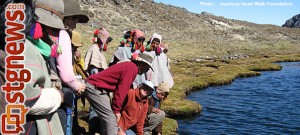
ST. GEORGE – Founders of the St. George-based international humanitarian organization, Heart Walk Foundation are hiking high into the Andes Mountains of Peru this month to assess the organization’s decade of service to the indigenous Q’ero tribes and to determine conditions for improving and developing new sustainability projects.

Located at nearly 17,000 feet above sea level, remote Q’ero villages have been isolated from the developing world for centuries. The location of the villages requires hikers to be in the very best physical condition. Foundation leaders have been training for months to bear the physical demands of the trip.
This year, Southern Utah biologist Egan Rowe will travel with Heart Walk co-founders and Dammeron Valley residents Tim Eicher and Penelope Eicher. With degrees in biology and oceanography, Rowe will assess aquaculture conditions of mountain lakes and ponds to determine if various types of algae can be successfully cultivated for fish food.
“My goal is to evaluate how inexpensively we can feed the trout that are growing in Heart Walk trout farms,” Rowe said. “Essentially, we will be creating two new steps in the food chain, and to do so, it is critical to determine whether there will be appropriate environmental conditions.”
Currently, tribal leaders are trekking fish food pellets up the mountain. Rowe’s recommendation will include the introduction of algae that will both survive and compliment the existing ecosystem and allow the fish to feed naturally.
Since Heart Walk Foundation began its efforts to help the Q’ero people, seven trout farms have been established in the high mountains with three more in progress.
“We are very pleased with the success of the trout farm project and want to make it as efficient and economical as we can for the villages,” Penelope Eicher said. “It would be so nice if the people didn’t have to pack fish food up the mountains.”
“I have watched Tim and Penelope work for years to help these people,” Rowe said. “This is an amazing opportunity for me, and I am really excited to be able to use my training to possibly improve efficiency for the trout farms that add rich protein and minerals to their diet.”
In addition to trout farms, Heart Walk has built greenhouses and acquired donations of seeds to add a variety of green vegetables to the diet of a people who survived solely on potatoes for centuries; the only crop they could grow in the harsh mountain conditions. On this trip, the team will also assess education programs and schoolhouses built to provide education to Q’ero children, and to determine the viability of offering medical services.
Upon first meeting the Q’ero in 2003, Tim Eicher described a very solemn, thin and destitute group of nearly 500 people living practically hidden in the high Andes.
“When we first learned that the Q’ero had been refused by their government, we decided we had to do something about it,” he said. “Ten years is a wonderful milestone for us.”

Over the last decade, the foundation has worked to oversee the building of trout farms and greenhouses to add protein and variety to their diet, and schoolhouses to offer education.
“Before we arrived, these people had never even held a pencil,” Penelope Eicher said. “Our (main) goal has been to create vital sustainability programs for these forgotten and destitute descendants of the mighty Inca civilization.”
During her last trip to Peru in September, Penelope Eicher was accompanied by writer, photographer and documentarian Melynda Thorpe Burt of St. George. Burt filmed students at the Heart Walk Foundation School at Hueccouno, Peru and wrote about Q’ero families and their sacrifices and successes in working to integrate agriculture, education and health initiatives. Along with St. George-based film and sound technicians Keith Owen and Myke Bush, Burt recently submitted the documentary short film entitled “Heart of the Andes” to the DOCUTAH International Film Festival.
The mission of Heart Walk Foundation is to support the preservation of the Q’ero people and their native culture and traditional community living through improved agriculture, education and health initiatives. The foundation is supported by a national board of directors and more than 700 followers internationally. To donate, volunteer or learn more, call 435-619-0797 or visit the foundation website.
Related posts
- Heart of the filmmaker, ‘Heart of the Andes,’ shared at Heart Walk gala; STGNews Videocast
- Heart Walk Foundation Gala premieres ‘Heart of the Andes’
- Heart Walk Foundation bringing worlds closer through ‘Handprint Communication’
- Local Doctors to Provide Health Care in Ecuador
- Local businesswoman appointed to Heart Walk Foundation board of directors
- ‘Filming, Writing, Creating for Change,’ a talk by mother-son team of filmmaker and budding novelist
- Email: [email protected]
Copyright St. George News, SaintGeorgeUtah.com LLC, 2013, all rights reserved.

Hello There. I found your blog the usage of msn. That is a very neatly written article.
I’ll be sure to bookmark it and return to learn extra of your helpful information.
Thanks for the post. I will definitely return.